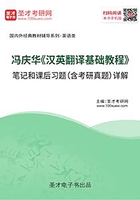
3.3 翻译示例汇总
一、名词的抽象译法
例1:名词抽象译法
◇暴力事件violence
蒸馏过程distillation
◇混乱状态confusion
解决方法solution
◇现代化modernization
工业化industrialism
◇个人主义individualism
社会主义socialism
◇发展活动development
走私活动smuggling
◇准确性accuracy
安全性safety
◇耐心态度patience
谦虚态度modesty
◇深度depth
长度length
◇蒸发作用evaporation
隔离政策segregation
◇吹毛求疵的做法fault-finding
声名狼藉的境地notoriety
◇徇私作风favoritism
轻松愉快的心情light-heartedness
◇崇高气质loftiness
蛮干作风fool-hardiness
◇过敏反应allergy
越轨行为irregularity
◇傲慢态度arrogance
沮丧情绪dejection
◇欢乐气氛gayety
紧张局势tension
◇嫉妒心理jealousy
转化过程transformation
◇冷漠态度indifference
不公正的现象injustice
◇主要旅游观光场所the major tourist attractions
◇波士顿的知识界人士the educated Boston
例2:成语和习语抽象译法
◇粗枝大叶to be crude and careless
◇海阔天空(to talk) at random
◇灯红酒绿dissipated and luxurious
◇纸醉金迷life of luxury and dissipation
◇单枪匹马to be single-handed in doing sth.
◇赤胆忠心ardent loyalty
例3:句子抽象译法
(1)我们要重视沿海与内地的贫富差距问题。
【译文】We must pay close attention to the gap between coastal and inland areas.
【解析】在原文中,“问题”与“差距”组合在一起。对于汉语读者来说这是很符合语言习惯的。但是对于英语读者来说,按照他们的思维,既然有“差距”,肯定就存在“问题”,不需要赘述。因此,翻译过程中要对“差距问题”进行抽象化处理,译为“gap”,更符合目的语的语言习惯。汉语中诸如此类的词语还有:任务、现象、情况、因素、局面、状况、态度等。
(2)我们必须与腐败和各种不公正现象作斗争。
【译文】we must combat corruption and injustice.
(3)我必须把我的各项政治活动安排得十分紧凑。
【译文】I had to work my political appearances into a tight schedule.
(4)你必须提出一些解决方案。
【译文】You must put forward some solutions.
(5)他有如此多的官方活动。
【译文】He has so many official responsibilities.
(6)我明白许多家庭今天都意识到他们家中少了人。
【译文】I knew that many families today were aware of absences.
(7)想起他年轻时的一些事情,他心里感到安慰。
【译文】It was the memories of his youth that gave him comfort.
(8)我知道我会碰到严寒酷暑。
【译文】I knew I would encounter extremes of weather.
(9)那辆小汽车是他刚弄到手的值得夸耀的东西。
【译文】The car is a proud new acquisition of his.
(10)他等着她来,急得像热锅上的蚂蚁。
【译文】He waited for her arrival with a frenzied agitation.
【解析】原文中形象具体的语言“急得像热锅上的蚂蚁”在译文中用了泛泛而论的抽象化说法“with a frenzied agitation”来代替。
(11)允跪而言日:“百姓有倒悬之危,君臣有危卵之急,非汝不能救也。”(罗贯中《三国演义》)
【译文】Wang Yun knelt saying, “The people are on the break of destruction, the prince and his officers are in jeopardy, and you, you are the only saviors.”
【解析】原文中的“倒悬之危”“危卵之急”都表示非常紧迫、非常紧要的关头,在译文中这两个形象已然无法保留,只有采取抽象的意译处理。
(12)妈妈非常激动,我感到她的背在颤抖,就在那一刻,我第一次明白妈妈也有脆弱的一面。
【译文】In that moment, feeling mother’s back racked with emotion, I understood for the first time her vulnerability.
【解析】译文中把“脆弱的一面”处理为抽象名词vulnerability。
二、名词的具体译法
例1:词语具体译法
◇快活的人a jolly dog
◇微不足道的人a small potato
◇正派的人the quite and clean potato
◇脾气暴躁的人a surly dog
◇眼睛puddings and pies
◇缥缈的幸福pie in the sky
◇穿着讲究的人a cloth horse
◇难办的差事a tall order
◇最不受欢迎的东西garlic for desert
◇棘手的事情hot potatoes
例2:名词具体译法句子翻译实例
(1)俗话说,衣柜里面藏骷髅,见不得人的事家家都有。
【译文】Every family is said to have at least one skeleton in the cupboard.
(2)区分好人与坏人(或区分智者与愚者)。
【译文】Separate the sheep from the goats.
(3)他是个很难处理的人。
【译文】He is a hot potato.
(4)她是个无用而又累赘的人。
【译文】She is a white elephant.
(5)为了向世人证明希腊的历史可以追溯到公元前776年,做了大量的考古发掘工作。
【译文】It has taken many a pick and shovel to prove to the world that the history of Greece went back long before the year 776 BC.
(6)评论家和读者之间,也就是理智和感情之间的这种分歧如何解释呢?
【译文】How do we explain this split between the critics and the readers, the head and the heart?
(7)山姆知道不论境遇如何,他都可把家庭作为靠山。
【译文】Sam knows he can depend on his family, rain or shine.
例3:拟声词的译法
(1)工地上传来马达声。
【译文】From the construction site comes the rumbling of the machines.
(2)清幽的小巷里响起了清脆的自行车铃声。
【译文】I heard the crisp jangling of the bicycle rising from the quiet alley.
(3)刹车声刺激了我的神经。
【译文】The screeching of the breaks got on my nerves.
【解析】上面三个例子的原文中表示声音的词都是比较抽象的,但在翻译成英语时,都作了形象化处理,马达声的rumbling,自行车铃声的jangling和刹车声screeching,这些词都给我们“如闻其声,如临其境”的感觉,使得译文甚至超越了原文。